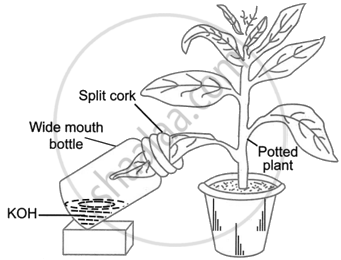Advertisements
Advertisements
प्रश्न
Name the following:
The cell organelle responsible for photosynthesis.
उत्तर
Chloroplast
APPEARS IN
संबंधित प्रश्न
The individual flattened stacks of membranous structures inside the chloroplasts are known as :
A. Grana
B. Stroma
C. Thylakoids
D. Cristae
The process of conversion of ADP into ATP during photosynthesis.
Expand the following biological abbreviations: ATP
Fill in the blank:
Photosynthesis produces oxygen and ______.
Choose the correct answer:
Which one of the following is the best reason for leaving a plant in a dark place before carrying out experiments on photosynthesis?
Mention one difference between the following on the basis of what is given in bracket.
Grass and grasshopper (mode of nutrition)
What is the importance of photosynthesis in the life of the following:
Non-green plants
What is the law of limiting factors?
Complete the following sentence with appropriate word:
A light reaction is a ___________ reaction.
Complete the following sentence with appropriate word:
4OH ——> _____ + O2
Choose the Correct Answer:
Which one of the following would not be a limiting factor for photosynthesis?
During photosynthesis, ________ is produced and stored in the leaf.
Photosynthesis converts energy X into energy Y.
- What are X and Y?
- Green plants are autotrophic in their mode of nutrition. Why?
Read the following sentences about photosynthesis.
- Sunlight, carbon dioxide, chlorophyll and water are necessary.
- Oxygen is absorbed.
- Leaves carry out photosynthesis.
- Proteins are made during photosynthesis.
Choose the correct pair of sentences that are true to photosynthesis.
Only green plants have the unique capacity to release ______ into the atmosphere.
Define photosynthesis.
Draw the structure of the stomata and label the parts.
What are stomata?
Study the diagram given below and fill in the blanks with suitable words:

In order to prove that carbon dioxide is necessary for
(a) ______, a potted plant is placed in dark for 48 hours to (b) ______ the leaves. A part of a leaf is inserted into a conical flask containing potassium hydroxide solution. This is to absorb (c) ______ from the flask. The plant is then placed in sunlight for a few hours. The experimental leaf is tested for starch. The part of the leaf that was inside the conical flask turns (d) ______, whereas the part of the left outside turns (e) ______ in colour.
Which of the following is not applicable to the process of photosynthesis?
